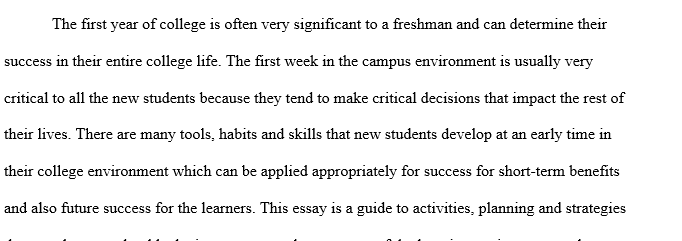Surviving the First Semester of College
Topic: A “Guide” to Surviving the First Semester of College (or Writing)
Essay 1: Mandatory length: two or more pages with multiple paragraphs
A note on evaluation: This series of essays is evaluated through comment only, since 099 is Pass/Fail. I will, if students ask, give a grade that represents where the essay is (A, B, or C-range). At the end of the term, students turn in a Portfolio with all early drafts and their Final Synthesis (Onion) Essay along with a Reflection Essay, and that Portfolio will determine whether you pass or fail. See the instructions for the final project for more information.
Using the paragraphs/free writes that you’ve been writing in response to How to Lose a Marathon, you will assemble an essay/guidebook that aids or assists a future freshmen to survive the perils and pitfalls of the first semester of college. This guidebook will help you:
to develop descriptive writing and observation skills
to develop narrative(or storytelling skills), including humor in truth
to learn the difference between “showing” and “telling”
to give the reader a sense of you, the writer, as someone who is involved with what is being written
Your audience is future freshmen, your friends, even strangers your age. Assume your audience is interested in what you are describing but may not know anything about it. Your purpose is to give your audience a sense of why you chose to write about this experience—your excitement, confusion, frustration, anger, joy, and possibly finding humor in the mundane. You will want to include details, sensations, and even speaking (dialogue). Together these few sentences actually create a scene. A scene is where action and dialogue are shown as they happened rather than reported later. Your scene could be bookended by an introduction and a conclusion that tell the reader why this experience is important and what you learned from it or how it affected you, or you might weave comments to the reader throughout the essay/guidebook, even interrupting the story. Your essay may have many small scenes or one main scene.
Evaluation/Assessment: Your essay will be evaluated on
description—choosing specific and interesting details, using senses such as smelling, tasting, hearing, and touching;
using dialogue and scenes to show rather than just tell;
audience and purpose—conveying a sense of who you, the writer, are and your connection to what you’re writing about to add ethos or credibility;
organization and flow;
mechanics—spelling, punctuation, and other surface structural issue; and
following instructions.
Answer the following Peer Review Questions for full credit on the peer review:
What is the main point of the essay?
Comment on the introduction. Is it interesting? Does it make you want to read on? Make a suggestion regarding the introduction.
Does the essay contain enough support for the main point? Where could the essay use more support or details? Make suggestions to improve the support or the details.
Are there places where you have had to stop and re-read something to understand it? Point it out to the author. Make a suggestion to make it better.
How are the transitions between ideas and paragraphs? Is the transition clear? Could the author use a better connection? Is the “Z” visible?
Comment on the conclusion. Is it interesting? Does it fade out or is it too forceful? Make a suggestion regarding the conclusion.
Where else could the essay be better? What would you do if it were your essay?
What grade would you give this essay in its current form? Why would you assign this grade?
Solution preview for the order on Surviving the First Semester of College
APA
674 words
